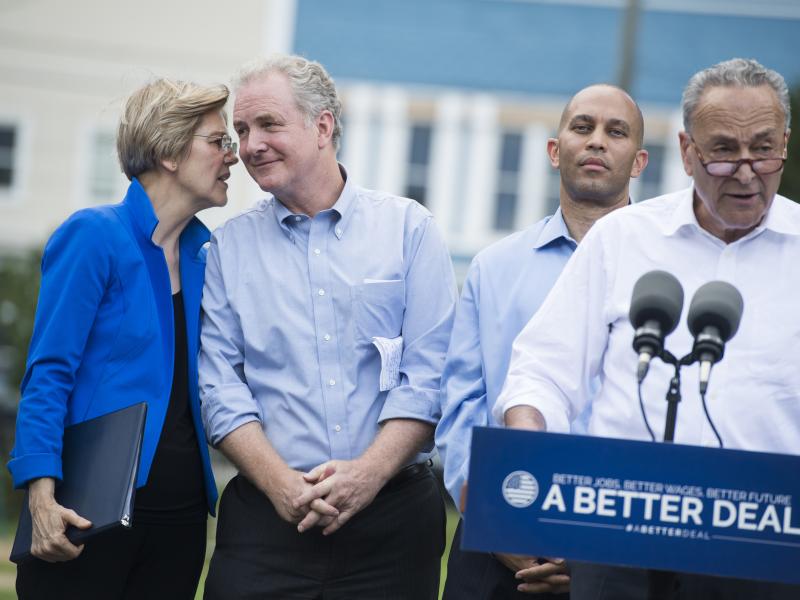
To the extent that there are “normal” times in American politics, the general line of demarcation is fairly straightforward: Democrats vs. Republicans. Even factoring in shades of liberal, moderate, and conservative, and a bit of populism and libertarianism, it’s pretty easy to figure out where politicians stand. But in the era of Donald Trump, nothing is quite so simple.
Democrats are trying to figure out how acerbic they should be in their criticism of President Trump. In the recent Virginia Democratic gubernatorial primary, Lt. Gov. Ralph Northam, a pediatric neurologist, may well have gone over the top, outdoing his rival by calling Trump a “narcissistic maniac.” Northam doesn’t ordinarily resort to extreme language, but he must have thought that catchy phrase would establish him as hard-core liberal, to the dismay of his rival, former Rep. Tom Perriello, who actually is a liberal. My guess is that Northam will use the line less in the general election.
For Republicans, it’s even more complicated. I asked a smart, veteran campaign Republican consultant what advice he was giving clients in competitive races on how to best navigate between Trumpism and traditional Republicanism. “Localize the race without needlessly antagonizing Trump or his supporters,” he said.
That’s sensible guidance. A Republican running next year should try to avoid making his or her election a referendum on Washington or Congress, or how much or little has been done. A nationalized race is the last thing Republicans want.
His second piece of advice: “Make the choice about the best candidate to represent the interests, values, and needs of your constituents. Say you’ll support Trump when his positions help your district, and oppose him then they don’t.” This suggestion is an extension of the first. Make the race about two candidates squared off against each other, not a referendum on how the country is doing.
His final piece of advice: “And by all means, avoid getting drawn into reacting to every Trump tweet or new position.” If candidates comment on every controversial statement Trump makes, they’ll never have time to explain their own positions. I suggest they simply say, “My name is on the ballot in this district/state, not President Trump’s. I am running my race; he can speak for himself.”
The consultant noted that it is “easier for gubernatorial or other state-level candidates who have always been able to separate themselves more successfully from their national party, but it can work for federal candidates as well.” It could be added that for all Republican candidates next year, the worry should be about whether there is a decline in GOP turnout and whether Trump voters will show up. The direct fallout from an unpopular president falls far more heavily on House and Senate candidates.
It should be pointed out that the above advice is exactly the approach that Karen Handel employed in her come-from-behind victory in Georgia’s 6th Congressional District special election last month. Candidates need to be able to thread the needle, not taking on the burdens of Trump but not alienating his supporters either.
Democrats can take a different tack next year. They can nationalize their races, make them a referendum on Trump and Republicans in Congress, stay away from local issues, and run as “send-them-a-message” candidates. In other words, do exactly what Republican candidates did to Democrats in 2010 and 2014.
It’s fashionable these days to say that Democrats have to stand for something if they’re going to win a House majority and break even in the Senate. Balderdash. I have never seen a party win a midterm election on the issues; midterms are always a referendum on the party in power.
The party in the White House has gained House seats in only two modern elections, and the circumstances both times were special. In 1998, Democrats rode a backlash against the Republican majority in Congress that was preparing to impeach President Clinton. In 2002, 14 months after the 9/11 attacks, the GOP made modest gains in an election that was about patriotism after a national emergency.
Some political buffs might ask about 1994 and the Contract with America that Newt Gingrich and Republicans ran on. Many forget, or never knew, that the Contract with America was announced only six weeks before the election, after it was already clear that the election was going to be a disaster for Clinton and congressional Democrats.
The proportion of people who were aware of the Contract before the election was actually quite small. If memory serves, it was mainly distributed as an insert in TV Guide. Gingrich deserves an enormous amount of credit for taking the fight to Clinton and Democrats and creating the atmosphere that helped rout them, but to say it was about issues is to overstate things by a ton. Clinton’s job-approval ratings had been in the high 30’s and low 40’s for much of the two years leading into that midterm, and the election was a referendum on him and his party. The Republicans’ strong suit was that they weren’t Democrats and were against Clinton. Those are the kinds of things that decide midterm elections.
This story was originally published on nationaljournal.com on July 28, 2017



Subscribe Today
Our subscribers have first access to individual race pages for each House, Senate and Governors race, which will include race ratings (each race is rated on a seven-point scale) and a narrative analysis pertaining to that race.